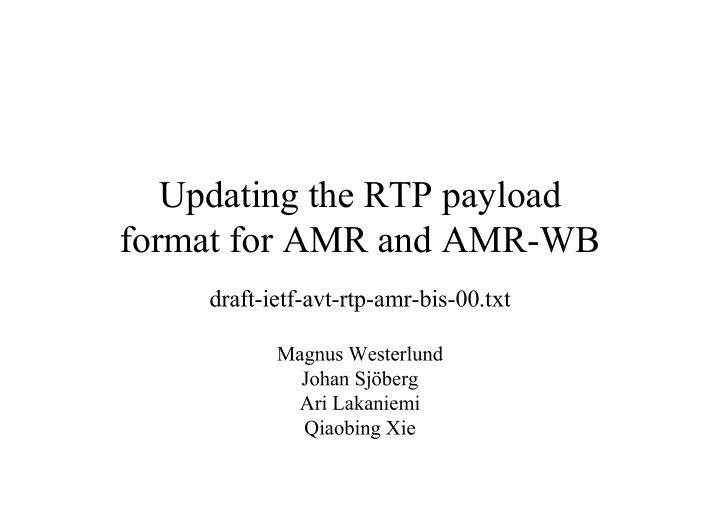

Updating the RTP payload format for AMR and AMR-WB draft-ietf-avt-rtp-amr-bis-00.txt Magnus Westerlund Johan Sjöberg Ari Lakaniemi Qiaobing Xie
Outline • Goals • RFC 3267 Shortcomings • Proposal • Interoperability Testing • Way Forward
Goals • Move to draft standard with update specification. – Correct errors and shortcomings in RFC 3267 – Gather interoperability report
Shortcomings and Errors • A few editorial errors in RFC 3267 as erroneous section references. • A few section where language can be improved. • Media type parameters for gateways are unclear. • Missing Offer/Answer section.
Changes 1/2 • Added clarification what behaviour in regards to mode change period and mode-change neighbour that is expected from an IP client, see Section 4.5. • Updated the maxptime for clarification. The sentence that previously read: "The time SHOULD be a multiple of the frame size." do now read "The time SHOULD be an integer multiple of the frame size. This should have no impact on interoperability. • Updated the definition of the mode-set parameter for clarification. • Clarified the bit-order in the CRC calculation in Section 4.4.2.1. • Corrected the reference in Section 5.3 for the Q and FT fields.
Changes 2/2 • Changed the padding bit definition in Section 5.3 so that it is clear that they shall be ignored. • Added a clarification that Comfort Noise frames with frame type 9, 10 and 11 SHALL NOT be used in the AMR file format. • Clarified in Section 4.3.2 that the rules about not sending NO_DATA frames do apply for all payload format configurations with the exception of the interleaved mode. • The reference list has been updated to now published RFCs: RFC 3711, RFC 3828, RFC 3550, and RFC 3551. A reference to 3GPP TS 26.101 has also been added. The previous reference [17] has been replaced by RFC 3448 (TFRC).
Offer / Answer Section • Draft contains a new Offer-Answer Section, see Section 8.3.1. • However that section has been discussed in private and it is clear it needs updates. • There are issues with the gateway related parameters: mode-set, mode-change-period and mode-change neighbour. • Mode-set needs to indicate bi-directional capabilities. This depending on the Codec Mode Request field where the requester should know which modes that are meaningful to request.
Offer / Answer Section • The mode-change-period is needed to be know as both receiving and sending capabilities. • GSM and UTMS circuit switched network has three different combinations supported: – FR_AMR: Sends MCP=2 and must receive MCP=2 – UMTS_AMR: Sends MCP=1 and receives MCP=1 – UMTS_AMR2: Sends MCP=2 and receives MCP=1 • IP clients are assumed to behave as UMTS_AMR.
Offer / Answer Section • A expected interpretation of the mode-change- period parameter is that it is declarative and describes receivers requirements. • To avoid changing this for minimal issues with deployed base, a new parameter (mode-change- capabilities) is proposed. It expresses the sending capabilities of the offerer or answerer and is also declarative. Lack of the parameter is MCP=1 • We also propose to restrict MCP and MCC to only allow values 1 and 2 of change period.
Offer / Answer Section • The combination of MCP and MCC allows the participants to determine if the call is going to work or not. • To get certain combinations to work, transcoders is needed, or call failure will happen. A second payload type with less preference can be used to indicate support for transcoding. • IP clients are strongly encourage to support sending MCP=2 to interoperate with gateways.
Offer / Answer Section • Mode-change-neighbour is proposed to be changed to being only a indication, and not something you must support. The reason is that is usually work, even if MCN is not supported. • Is is recommended that a IP client supports sending with mode-changes only to nearest neighbour. • Changes will affect both Offer/Answer section and parameter definitions.
Interoperability Testing • Ericsson and Nokia has performed tests of around 50% of the combinations between: – Bandwidth efficient or Octet Align – CRC – Interleaving – Robust sorting – Channels • Help with signalling part, implementation and testing reports from SIP clients having offer / answer support for AMR and AMR-WB is desired.
Way Forward • The draft will be updated to reflect proposal • Hopefully interoperability reports can be gathered quite quickly. However the offer / answer procedures must be tested. • If not, the way forward may be to publish the updated specification as proposed standard.
Recommend
More recommend